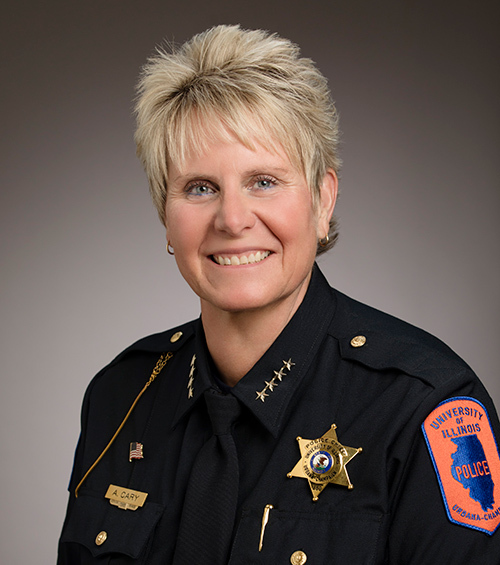Chief Alice Cary brings new experiences to UIPD

Photo Courtesy of The Office of the Chancellor
UIPD Chief of Police Alice Cary poses for a professional headshot. Cary assumed the position on July 20 and has brought her decades of experience in policing to the table.
March 10, 2021
A man stood screaming as he burned to death surrounded by unrecognizable car parts on a metal bridge.
A young Alice Cary, executive director of public safety and chief of police for the University of Illinois Police Department, or the UIPD, listened to her superiors tell her she couldn’t save him because of the danger the heat posed to her own life.
She said she can still hear his screams.
The number of times Cary has responded to instances of car crashes, child abuse, domestic violence and fatalities over the 35 years she has served as a cop are too many to count, she said. All of these traumas live as memories in her mind.
“It’s very traumatic, and it sits here,” Cary said while gesturing to her head.
Get The Daily Illini in your inbox!
In addition to the traumas many officers have to go through, Cary said being a woman posed its own challenges. Throughout Cary’s career, she has combatted sexual harassment and discrimination.
“Officers put their hands on me, back in the day, and it was very challenging as a young female dealing with that,” Cary said.
While sexual harassment and discrimination are prevalent in law enforcement today, Cary said she hasn’t experienced any since coming to the University of Illinois.
Ed Wojcicki, executive director for the Illinois Association of Chiefs of Police, said there haven’t been many female chiefs of police. He said the exact number throughout the history of Illinois is not known, however, he estimates there have been about 10.
Cary said she credits improvements in female representation and the decrease in discrimination in the workplace to younger generations beginning to work in law enforcement.
“I think there’s a better understanding and acceptance of females and minorities in this field,” Cary said. “I think that’s the next generation that’s really going to make a difference in how law enforcement moves forward.”
Working with younger individuals is something Cary enjoys. She said she learns every day from students, which is part of what attracted her to university police.
Wojcicki said policing on a college campus is different.
“When you’re policing a university campus, you pretty much always remember that college kids do things that college kids do,” Wojcicki said. “They test the limits of things, and I think university police recognize that and want to be supportive while still maintaining order.”
Cary said she works at the University of Illinois to help students have a safe environment to learn.
“Seeing what we can do to help our youth flourish, get an education and be a part of the next generation is what attracted me to higher education,” Cary said.
To do this, Cary said she wants to create a 24-hour separate entity to respond to nonviolent mental health calls. This past January, she hired Meghan Cambron, a licensed clinical social worker, to help officers with mental health crisis calls.
“I read in an article that there are certain age groups that self-harm claims have gone up over 300%,” Cary said. “This is our youth. We’ve got to do something.”
A. Naomi Paik, associate professor and faculty fellow in Legal Humanities, said she thinks the UIPD should be kept separate from mental health crises.
“There’s peer-reviewed, academic research that shows that co-responder models do not decrease or mitigate the violence of police encounters in mental health crises,” Paik said. “What they do is make cops feel better about their work, but they don’t actually reduce violence or help.”
Instead, Paik said she thinks the counseling department should get more funding.
As a public figure for the University of Illinois, Cary said criticism is not foreign to her. She said she welcomes criticism in an effort to better serve the community.
The main criticism Cary said she hears pertains to the Black Lives Matter movement, which saw an increase in attention after the death of George Floyd, a Black man who died in May as a result of police brutality.
When Cary saw the video of the officer kneeling on George Floyd’s neck, she said her heart broke, and the image is burned into her brain. As an individual working in law enforcement, Cary said she acknowledges improvements need to be made so situations like George Floyd’s won’t happen again.
The post-traumatic stress many officers experience motivates their actions on the streets, Cary said. In her opinion, programs for officer support and mental health are necessary.
Cary said she has experienced some of the symptoms of post-traumatic stress disorder, however, due to mental health support provided in Wyoming, she was able to overcome it. Cary said this support hasn’t reached Illinois.
“There’s so much work to do with law enforcement and law enforcement reform, and I want to stay here and have that opportunity to say we made it better for the next generation,” Cary said.






